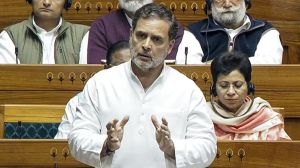Inquiry set up as 3 women after C-section on same day die of suspected sepsis
There are plans to establish a 200-bed hospital, which should provide some relief," District Surgeon Dr Pramod Khandate said.
 Photo of Vaishali's husband, Satyavan Meshram with their newborn
PC: sourced
Photo of Vaishali's husband, Satyavan Meshram with their newborn
PC: sourced The District Health Departm-ent has instituted an inquiry after three women, admitted on the same day to the state run Women’s Hospital in Gadchiroli, succumbed to complications that arose during their pregnancies. These are the first maternal deaths reported in the hospital in the last six months. The three mothers, facing post-delivery complications, admitted together on September 24, were referred to the distant Nagpur Government Medical College and Hospital (GMCH) due to a shortage of specialists. However, they did not survive the suspected sepsis.
The three women, Rajni Prakash Shedamake (23) from Bhansi, Ujjwala Naresh Bure (22) from Chamorshi and Vaishali Satyawan Meshram (24) from Ashti, were admitted to the government-run Women and Children’s Hospital for childbirth on September 24. All of them had caesarean surgeries, but unfortunately, they all shortly thereafter encountered complications.
“Rajni began to experience fever, breathing difficulty and diarrhoea, while Ujjwala and Vaishali developed fever and diarrhoea. Due to their worsening condition, all three were transferred to the district’s Civil Hospital on September 27 evening,” said a doctor from the hospital.
The district’s Civil Hospital, which serves the local population, lacks the necessary specialists and equipment to treat mothers. Consequently, they were referred to Nagpur GMCH.
“The Civil Hospital has gynaecologists and medical experts, but the condition of the three mothers was so severe that they required specialised ICU care. Since we don’t have a medical college like Nagpur has, we don’t have highly qualified doctors. So, we had to refer them,” said District Surgeon Dr Pramod Khandate.
In the evening, Rajli died during treatment before she could be transferred, while Ujjwala and Vaishali were recommended to be moved to Nagpur. However, Ujjwala lost her life in the ambulance en route to Nagpur, reaching Armori around 11 pm. Vaishali, on the other hand, succumbed to her condition during treatment on October 3 in Nagpur GMCH. This is the first time that three subsequent maternal deaths were reported within ten days.
When questioned about the cause of their deaths, Khandate said, “The primary cause appears to be sepsis. Autopsies will be necessary to confirm the exact cause of death.”
Sepsis is a severe, life-threatening condition caused by the body’s response to infection, leading to organ dysfunction. Preventing sepsis involves proper hygiene, timely treatment of infections and vaccination.
These were the hospital’s first maternal deaths since March. “This is the first death in six months. An inquiry committee, led by additional district surgeons, has been formed. We will only know the cause of death after the committee submits its report,” stated Dr Khandate.
All three infants delivered by the women are in good health. Relatives have accused doctors of negligence, reigniting concerns about the healthcare system in Gadchiroli.
Vaishali’s husband, Satyavan Meshram, has raised concerns about medical negligence and delay in treatment. He said, “My wife’s condition continued to worsen, and we had to travel 150 km to Nagpur from our village. Unfortunately, I couldn’t save her. The doctor mentioned that she had contracted an infection that spread throughout her body. If they didn’t have a qualified doctor, why didn’t they refer her earlier?”
He further said, “She couldn’t even hold our baby once.”
Hospital officials said the hospital was facing a shortage of medical personnel. “Our hospital has a capacity of 100 beds, but we often admit an additional 120 patients. Unfortunately, our staff is limited, and we face a manpower shortage. We strive to deliver quality care, but for severe cases, we must refer patients elsewhere.
There are plans to establish a 200-bed hospital, which should provide some relief,” Khandate said.
 Infant patients admitted at Dr Shankarrao Chavan Government Medical College and Hospital where as many as 31 deaths, including those of infants, were recorded in 48 hours since September 30, in Nanded, Tuesday, Oct. 3, 2023. (PTI)
Infant patients admitted at Dr Shankarrao Chavan Government Medical College and Hospital where as many as 31 deaths, including those of infants, were recorded in 48 hours since September 30, in Nanded, Tuesday, Oct. 3, 2023. (PTI)
The government approved 10 new hospitals for nine districts in July this year, which include Palghar, Ambernath (Thane), Gadchiroli and Amravati.
Maternal death rate reflects the safety of childbirth and overall maternal health, a key indicator of healthcare and societal well-being. As per doctors, common medical causes of maternal deaths include severe bleeding (postpartum hemorrhage), high blood pressure and related disorders (eclampsia and pre-eclampsia), infections, blood clots and complications from unsafe abortions.
“Deaths are preventable with specialist care, but long journeys for referrals deter timely treatment. Tragically, some pregnant women have died en route,” said Bandu Sane, a representative of NGO Khoj from Melghat. “Although incidences of home-birth have decreased with more institutional deliveries, the infrastructure of hospitals remains unchanged,” he added.







